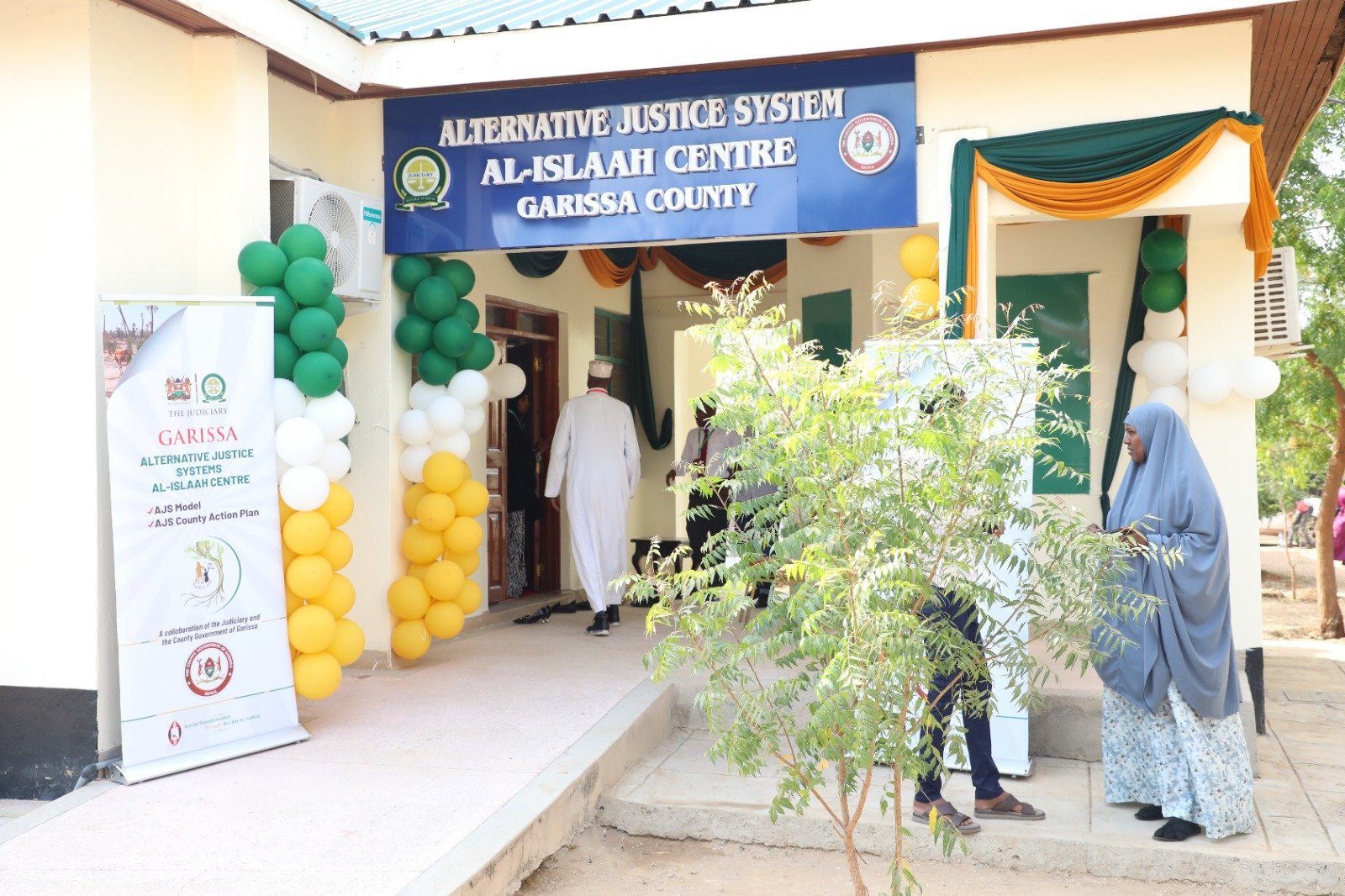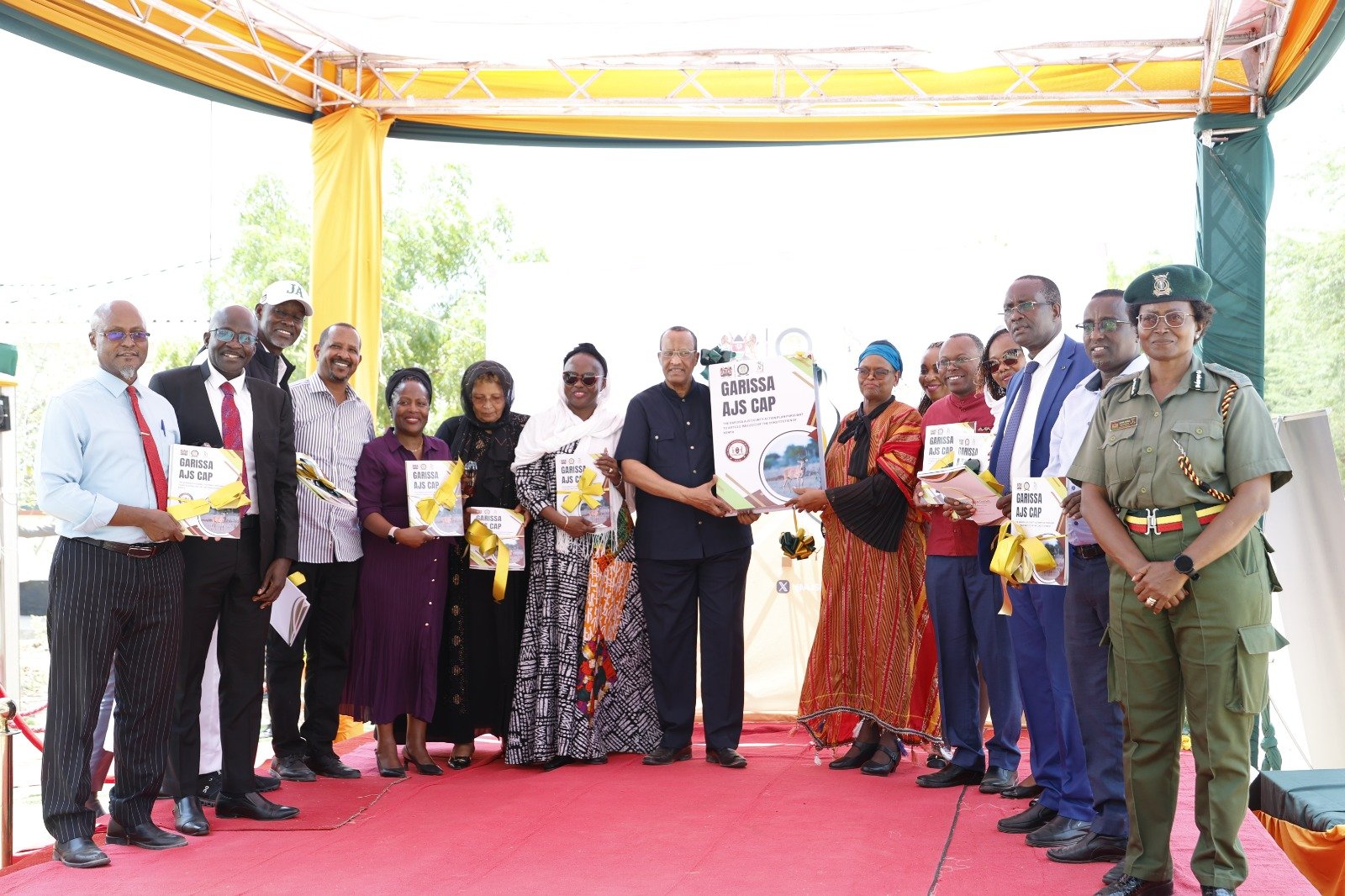
 The Alternative Justice Systems Centre, AL-Islaah Centre, at the the Garissa Law Courts, September 2, 2025. /JUDICIARY
The Alternative Justice Systems Centre, AL-Islaah Centre, at the the Garissa Law Courts, September 2, 2025. /JUDICIARY
Chief Justice Martha Koome has hailed the Alternative Justice System as a critical tool in fostering peace and harmony, urging Kenyans to embrace community-driven conflict resolution mechanisms.
Speaking on Tuesday during the launch of the AL-Islaah Centre at the Garissa Law Courts, Koome described the initiative as a landmark step towards inclusive and restorative justice.
“I wish to emphasise that AJS plays a critical role in peacebuilding and conflict resolution. We are looking for a transformed society which is harmonious and allows everybody to realise their full potential,” she said.
The CJ explained that the AL-Islaah Centre, whose name means reconciliation in Arabic, would be a cultural symbol of peace, dialogue and unity.
“AL-Islaah means reconciliation in Arabic, it captures the spirit of the centre. It will be a place where the wisdom of elders and moral authority of religious leaders and the myriad of mediators will converge to offer resolutions that bring healing in relationships rather than deepen divisions,” Koome said.
She stressed that the centre is not meant to punish but to restore broken bonds and foster lasting peace.
The CJ noted that AJS was not an option but a necessity for Garissa, a vast region where limited resources hinder access to formal courts.
Citing a survey, she revealed that more than half of Garissa residents have experienced disputes, with land conflicts accounting for nearly 40 per cent.
Intercommunal disputes, petty offences and family conflicts were also prevalent.
“For most of these residents, religious leaders remain the default arbiters of justice whereby they have been resolving over 56 per cent of disputes in Garissa,” she said.
Koome added that the Garissa AJS County Action Plan guarantees inclusive, rights-based justice in which women, youth, minorities and persons with disabilities are not just beneficiaries but “active participants in shaping outcomes.”
The event brought together judicial officers and political leaders led by Governor Nathif Jama.
 Chief Justice Martha Koome and Garissa Governor Nathif Jama Adam and other judicial officers during the official launch of the Alternative Justice Systems Centre, AL-Islaah Centre, at the Garissa Law Courts, September 2, 2025. /JUDICIARY
Chief Justice Martha Koome and Garissa Governor Nathif Jama Adam and other judicial officers during the official launch of the Alternative Justice Systems Centre, AL-Islaah Centre, at the Garissa Law Courts, September 2, 2025. /JUDICIARYChief Registrar of the Judiciary Winfridah Mokaya underscored the county’s unique role in demonstrating the value of AJS.
“What makes today’s launch in Garissa significant is that this county is uniquely placed to demonstrate the power of AJS. Garissa has a proud heritage of elders’ councils, strong Islamic traditions of justice, and vibrant community structures where dialogue, reconciliation, and consensus remain central to resolving disputes,” Mokaya said.
She added, “Building modern courts, supporting mobile courts, and strengthening AJS mechanisms are not separate agendas; they are complementary pathways that expand the doorways of justice.”
Justice Prof. Joel Ngugi, chairperson of the National Steering Committee on Implementation of AJS, said the system being rolled out is a modernised form of traditional conflict resolution.
“Today, we are celebrating the official launch of the alternative justice system, a mechanism that has been used since tradition as one way of attaining justice. The system we are launching is an alternative justice system that has emphasised human rights, principles, and the constitution,” he said.
Other speakers echoed the importance of community-driven justice.
Justice John Onyiego, Presiding Judge of the Garissa Law Courts, noted: “The Northeastern is a vast region which makes the cost of access to justice punitive. Most cases in this region are resolved through Maslaha which promotes affordability while ensuring Social Transformation through Access to Justice.”
Judicial Service Commission (JSC) Commissioner Everlyne Olwande reaffirmed institutional backing for AJS.
“The presence of the Judicial Service Commission here today underscores our commitment to facilitating access to justice, particularly to the underserved, in line with our constitutional mandate of promoting and facilitating the efficient, effective and transparent administration of justice,” she said.
She added: “I reaffirm the JSC’s commitment to supporting the entrenchment of AJS across the country. We will continue to provide the necessary policy direction, oversight, and institutional support to ensure that AJS thrives as a trusted and credible pathway to justice.”












